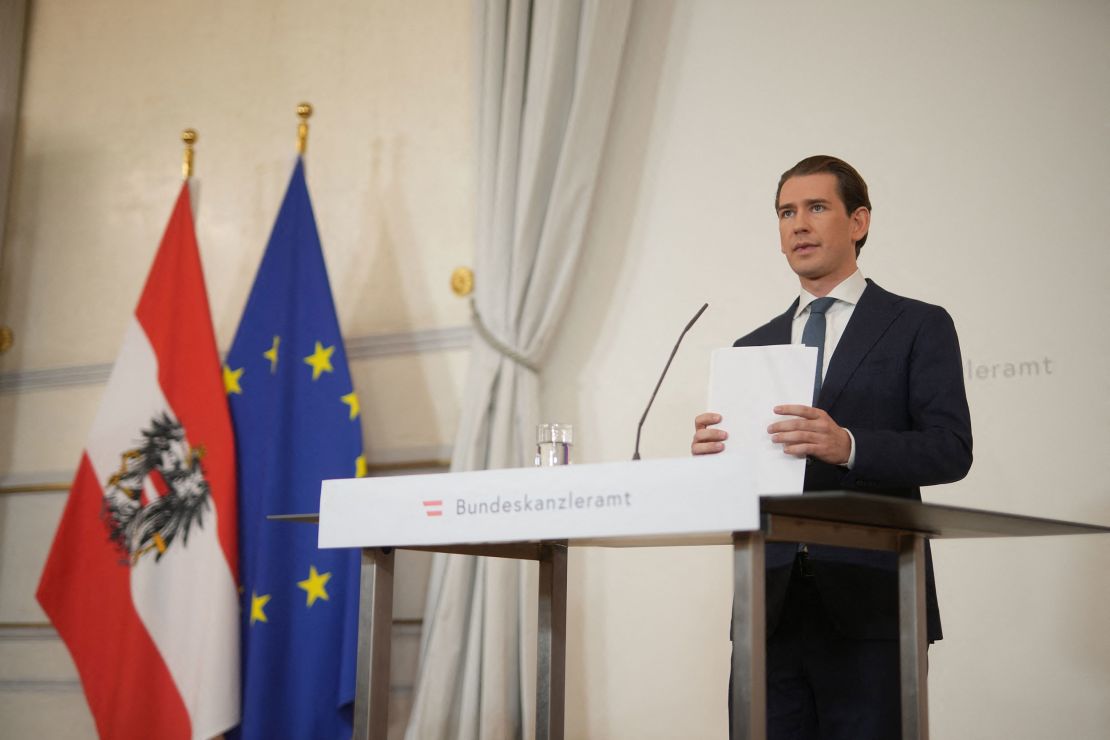Alexander Schallenberg was named Austria’s new chancellor on Monday after his predecessor, Sebastian Kurz, resigned abruptly amid a corruption scandal.
Former foreign minister Schallenberg was sworn in by President Alexander Van der Bellen at the Hofburg palace in Vienna. Schallenberg, 52, is a career diplomat and a close ally of the former chancellor.
Kurz will continue to lead the center-right Austrian People’s Party (ÖVP) and will remain a member of Austria’s parliament.
A spokesperson for the chancellery told CNN on Sunday that Kurz “enjoys the full support of the people’s party.”
Opposition politicians say this means Kurz will effectively remain in charge of the country but with Schallenberg, who is relatively new both to politics and to the ÖVP party, as a figurehead.
Pamela Rendi-Wagner, leader of the center-left Social Democratic Party (SPÖ), said Kurz would remain a very influential figure.
On Saturday, Kurz announced that he was stepping down from his position, days after his office was raided by Austrian prosecutors investigating him and members of his team on suspicion of bribery and breach of trust.

The 35-year-old is under investigation over claims that government money was used to ensure positive coverage in a daily newspaper, Austrian prosecutors announced Wednesday.
Kurz said the corruption allegations against him were “wrong,” and denied that he had used government money for political purposes, but said: “I want to make space to guarantee stability.”
Opposition parties had threatened to bring a vote of no confidence against Kurz in parliament on Tuesday.
Over the weekend, Van der Bellen said trust in Austria’s political system had been “massively hit,” and that it was now up to politicians to repair the damage through “serious and concentrated work,” according to public service broadcaster ORF.
‘Manipulated’ results
Kurz is under investigation alongside nine other individuals and three organizations, according to a statement from the Office of Austria’s Attorney General for Economic Affairs and Corruption (WKStA).
Raids were carried out in several locations – including two government ministries – last Wednesday as part of the inquiry, according to the prosecutor.
“Between 2016 and at least 2018, budgetary funds from the finance ministry were used to finance exclusively party-politically motivated, sometimes manipulated surveys conducted by an opinion research company in the interest of a political party and its top management,” the WKStA statement said.
“The survey results were published (without being declared as an advertisement) in the editorial section of an Austrian daily newspaper and other media belonging to the same group,” the statement read, adding that “suspected payments were made in return to the media company.”
Austrian media have identified the daily newspaper involved in the case as tabloid-format daily Österreich (Austria). The paper has rejected the accusations and denied any wrongdoing in multiple op-eds published this week.
Kurz led the ÖVP into government in 2017, in coalition with the far-right Freedom Party, having turned the refugee influx of 2015 into a vote-winner at the ballot box.
He arrived in power just as Chancellor Angela Merkel’s grip in neighboring Germany appeared to be weakening. He seemed keen to dismantle at least some of her welcoming approach to migrants and take the continent down a more hardline path, despite insisting regularly on his support for the European project.
He and his government lost a vote of no-confidence in May 2019, following a corruption scandal prompted by a secretly-filmed video of his vice-chancellor Heinz-Christian Strache. But they returned to power after winning a general election September of the same year.
CNN’s Kara Fox, Martin Goillandeau and Niamh Kennedy contributed reporting.




